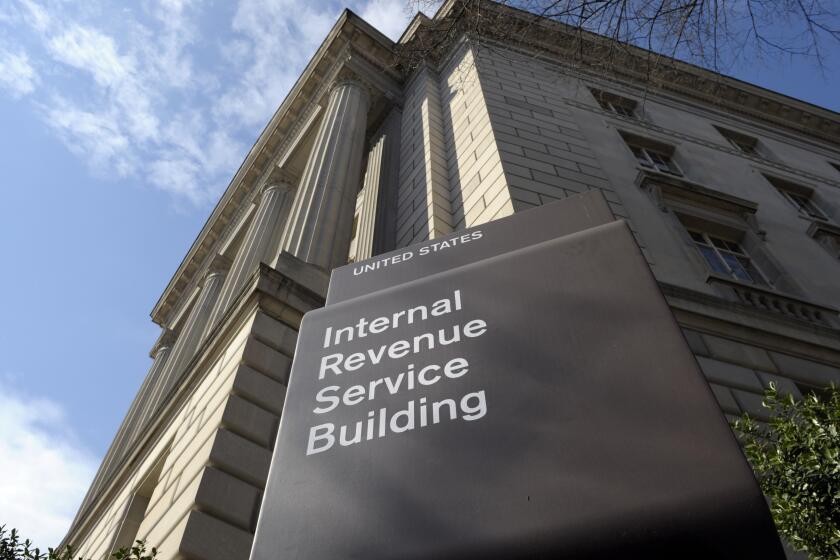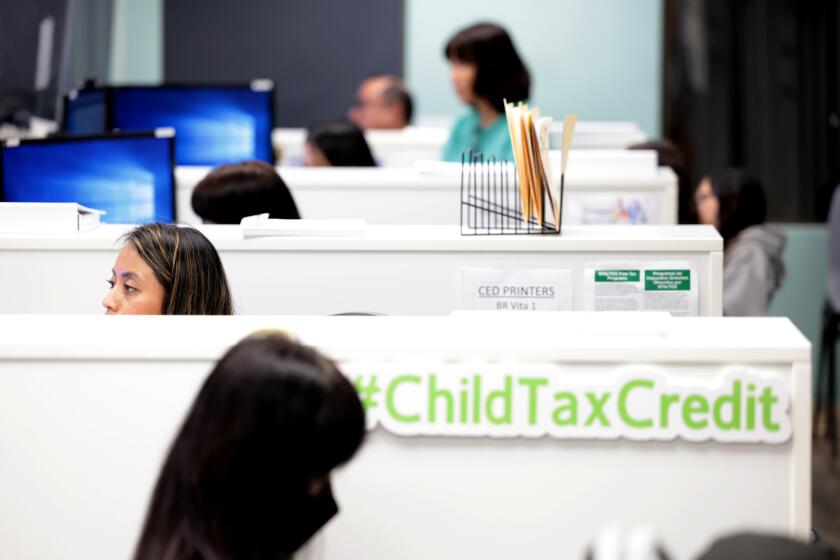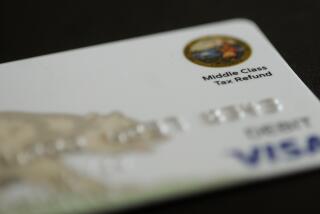Still haven’t filed your taxes? How to avoid penalties or lost refunds

After the epic storms deluged California in early 2023, the IRS and the state Franchise Tax Board gave most taxpayers in the state until mid-November to file their returns and pay what they owed.
After the epic storms deluged California in early 2024, the IRS and the Franchise Tax Board gave taxpayers in San Diego County until mid-June to file their returns and pay what they owe. For everyone else in the state, Monday remains the filing deadline — at least at the moment.
If you don’t pay at least a goodly chunk of your 2023 taxes by then, you will be penalized automatically, even if you file for an extension by Monday night.
Tax experts say the best course of action is to file your return on time and pay everything you think you owe. The IRS, nonprofit groups and commercial tax-preparation companies offer multiple ways to prepare and file returns for free online.
If you can’t afford your tax bill, you have some choices to make by Monday at 11:59 p.m., when the deadline is due to arrive.
There is a chance President Biden will approve Gov. Gavin Newsom’s request for a major disaster declaration covering Los Angeles, Ventura, Butte, Glenn, Monterey, San Luis Obispo, Santa Barbara, Santa Cruz and Sutter counties by the end of the day Monday, which could trigger a delay in the tax-filing deadlines. Counting on a last-minute reprieve, however, is a gamble with potentially high stakes, depending on how much you owe in taxes for 2023.
Californians have left millions of dollars in unclaimed tax refunds from 2020 with the Internal Revenue Service. And if they don’t act soon, they’ll donate that money to the federal government.
What are the penalties for not filing?
Tax experts say that if the IRS owes you a refund, you won’t face a penalty for not filing your return. Instead, you’ll have a different deadline: If you wait more than three years to file a return for that year, you’ll sacrifice your claim to the money.
If you have taxes due, Andy Phillips, director of H&R Block’s Tax Institute, said it’s important to file your return or file for an extension on time, even if you can’t cover the balance at the moment. That’s because the penalty for not filing can be up to 10 times the penalty for filing but not paying on time.
The IRS will charge you 5% of what you owe every month until you file, with the penalty capped at 25%, Phillips said. But it also charges interest, and there’s no cap on how much interest you’ll owe. Currently, the interest rate is 8%, compounded daily.
The Franchise Tax Board’s penalty is 5% per month, capped at 25%; the state’s tax code makes no mention of interest charges. It also imposes a lower penalty on people who owe no more than $540.
Both the feds and the state offer hardship exceptions.
The IRS is again giving taxpayers in disaster-stricken San Diego County more time to file their returns and pay what they owe this year.
Need more time to gather your paperwork? Both the IRS and the Franchise Tax Board offer six-month extensions on the deadline for filing an annual return to anyone who applies.
There is a catch, though: Even with an extension, you’ll still face an underpayment penalty if you don’t pay at least 90% of what you owe by the end of the day Monday, Phillips said. But at least you won’t be hit with the added penalty for not filing.
What are the penalties for not paying?
For the record:
3:59 p.m. April 12, 2024An earlier version of this story said the IRS penalty for unpaid taxes was 5% of the unpaid balance plus 0.5% per month, up to a maximum of 25%, plus interest. That is the Franchise Tax Board’s penalty. The IRS charges 0.5% per month, up to a maximum of 25%, plus interest.
The IRS charges .5% of the original underpayment per month the balance is not paid, capped at 25%, plus interest. The Franchise Tax Board charges 5% of the underpayment plus .5% per month, capped at 25%, with interest, which is currently 8%.
Phillips said the IRS applies a penalty only if you paid less than 90% of what you owed by the deadline. If you are facing a penalty, he said, you need to consider how that amount (including interest) stacks up against the cost of taking out a loan, using your credit cards or pulling cash out of savings or profitable investments.
One option is to enter a payment plan with the IRS, which will cut the underpayment penalty in half, Phillips said — although you’ll still be paying interest on the amount you owe while you’re chipping away at your balance. As long as you’re compliant with the plan, he said, the IRS won’t go into forced-collection mode.
The online system, aimed at low- and moderate-income taxpayers, offers more help than the IRS’ Free File program. It has launched in California and 11 other states in a trial run.
You can apply for a payment plan with the IRS through the agency’s website.
The Franchise Tax Board also offers installment plans that allow you to pay your tax debt over time, typically three to five years. The plans are available only to taxpayers who owe less than $25,000 and who’ve filed all required returns in the previous five years. Applications are accepted online, by mail or by calling (800) 689-4776.
The state offers to cancel a late-payment or late-filing penalty for taxpayers who are otherwise in compliance, but a taxpayer can claim this relief only once in their lifetime. In addition, the offer applies only to penalties for tax years 2022 or later.
To apply for a one-time abatement, return a completed form FTB 2918 by mail or call 800-689-4776 and request one.
How does the IRS collect penalties?
Regardless of whether you file a return, the IRS and the Franchise Tax Board will have collected data from employers, banks, mutual funds and other sources about your income and tax payments. And they will use that information to calculate what they believe you owe (or what they owe you). They won’t refund your overpayment automatically — you’ll get that only if you file a return — but they can force you to pay the taxes you’ve underpaid.
Phillips said the IRS typically starts by sending a letter asking you to pay up. If you don’t, it can seize a portion of your wages, your Social Security benefits and your investments. As a last resort, he said, it can put a lien on your house and force its sale.
To avoid going into collection, Phillips said, you might offer to pay a compromise amount — for example, if you can show that you weren’t responsible for the underpayment. The feds accept only a small percentage of the applications for this kind of relief, he said; it’s more likely that the agency will put you into a payment plan or temporarily suspend collection efforts until your income grows. If you find yourself in the latter category, you will face ever-growing interest charges on your unpaid tax debt.
Consumer advocates warn taxpayers to be cautious about hiring anyone who promises to be able to slash your tax debt, because many of those pitches are from scammers. Phillips agreed, saying, “Make sure you do your homework about who you’re dealing with.”
At free tax sites across Los Angeles, volunteer tax preparers help low-income workers file their taxes and access the earned income tax credit.
Who has to file a return?
The feds require anyone who earns more than a certain amount set by the IRS to file a return, even if they don’t owe anything. The amount varies according to filing status and age; for example, for 2023 it was $13,850 for a single filer under 65, or $15,700 for a single filer 65 or older.
The requirement applies regardless of your citizenship status. But if you don’t have a Social Security number — for example, if you’re in the United States on a temporary work visa or you’re here without authorization — you’ll need to obtain an Individual Taxpayer Identification Number.
Mandy Irvine, associate director of economic mobility for United Ways of California, said it’s a misconception that an ITIN is a sign that you’re in the country without authorization — ITINs are used by anyone who doesn’t qualify for a Social Security number. In addition, the law bars the IRS from sharing the information it collects from tax returns with Immigration and Customs Enforcement.
Through myfreetaxes.org, the United Way connects people with IRS-certified volunteers to help them prepare and file their returns. If you need an ITIN, Irvine said, look for a volunteer site that has a certified acceptance agent who can check your passport or other documents to verify your identity. That way, she said, you won’t have to mail them to the IRS.
Where can I get last-minute help from the IRS?
The following Federal Taxpayer Assistance Centers will be open Saturday from 9 a.m. to 4 p.m.:
- 300 N. Los Angeles St., Los Angeles, CA 90012
- 501 W. Ocean Blvd., Long Beach, CA 90802
- 880 Front St., Suite 1247, San Diego, CA 92101
- 212 Coffee Road Suite 200, Bakersfield, CA 93309
- 2525 Capitol St., Fresno, CA 93721
- 1301 Clay St., Oakland, CA 94612
- 450 Golden Gate Ave., San Francisco, CA 94102
- 55 S. Market St., Suite 100, San Jose, CA 95113
- 4330 Watt Ave., Sacramento, CA 95821
The agency stressed that although IRS employees will be on hand to offer in-person help with questions and account issues, they will not prepare your taxes for you. It also suggested that you come equipped with two forms of identification (including a current government-issued photo ID), the Social Security or Taxpayer Identification numbers for everyone in your household, and any notices or mailings the IRS has sent you.
If you have a question about a tax return you’ve already filed, make sure to bring a copy with you.
More to Read
Inside the business of entertainment
The Wide Shot brings you news, analysis and insights on everything from streaming wars to production — and what it all means for the future.
You may occasionally receive promotional content from the Los Angeles Times.















